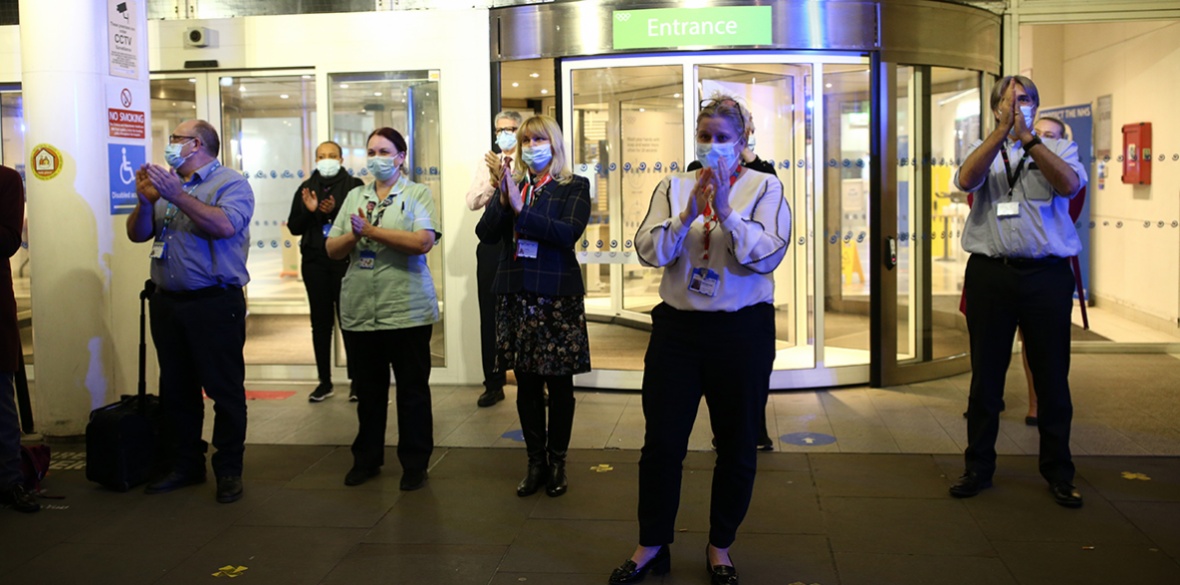This is the last article you can read this month
You can read more article this month
You can read more articles this month
Sorry your limit is up for this month
Reset on:
Please help support the Morning Star by subscribing here
THE full extent of the toll of the pandemic on the NHS and its staff is yet to be seen.
But from what we have seen thus far we can predict that the ongoing impact on the workforce and the NHS will be huge.
The NHS has a staff shortage of 100,000, which was set to rise to 250,000 by 2030 before the pandemic.
Now as many as one in three workers are considering leaving the NHS, with the pandemic highlighting the mental health — and indeed the financial health — problems many of us face.
On the front line we’re seeing whole wards being wiped out with staff sickness.
When an area has an outbreak, it brings it to its knees. This isn’t because of the lack of effort and hard work from the staff — we’re simply working in an already overwhelmed NHS under a government that doesn’t prioritise the safety of its workers.
Hospitals across England are getting more and more likely to reach capacity, which compounds the difficulties caused by lack of NHS beds in England, which have halved over the last 30 years.
I work as a front-line nurse in the NHS. During the 17 years I have been there, I started to realise that slow privatisation and underfunding of the NHS was happening right under our noses.
I could see bed numbers in hospitals dwindling, I could see the increasing need for agency staff and started to question why staffing was in that position in the first place, and the intrinsic link between investing in staff recruitment and retention on patient safety.
I could see ambulance service colleagues in new uniforms for private firms, I could see centralisation of services and closures of others.
I could see the increase in zero-hours contracts and outsourcing of departments such as HR.
The hospitals are relying on the goodwill of already exhausted and burnt-out staff to pick up overtime shifts or on agency workers who are often moved from area to area and are not routinely swabbed.
Workers employed on private contracts lose workers’ rights and protections and zero-hours contracts are becoming more common in the NHS.
Workers have no sick pay and their work-life balance is affected because they feel like they can’t say no to a shift as they can’t predict when the next one will be.
There is an impact on their mental health and they struggle to plan anything or budget their income. The contracts are precarious and exploit workers.
At the last count almost 1,000 healthcare workers had sadly lost their lives.
Healthcare workers are three to four times more likely to contract Covid-19 and the ongoing pressure is huge on the NHS.
One in 10 people go on to develop long Covid and it’s worrying what the workforce in the future will look like without urgent prioritisation of funding, investment in staffing, a stop to outsourcing and cuts, and better safety and conditions for workers.
Healthcare workers have had a real-terms pay cut of 15-20 per cent in the last decade.
Pay has a direct link to staffing and patient safety. Why would you want to get into tens of thousands of pounds of debt to train to be a nurse, to do a job that is underpaid and undervalued?
Why would you want to stay in a job that has poor working conditions that are getting worse, while not getting paid a decent living wage for a highly skilled job?
Our roles are expanding — each position in the NHS has taken on more responsibility, not least support workers, many of whom are paid minimum wage.
Pay campaigns such as #NHSPAY15, run by NHS Workers Say NO! and Nurses United, are fighting for a restorative pay rise for healthcare workers, with the backing of the GMB and Unite unions.
We expect to receive a pay offer back from the government in the coming months, which is predicted to be around 2-3 per cent.
The mood on the ground is angry and exhausted and we are building for possible industrial action anticipating this kind of pay offer.
If staff aren’t paid what they deserve and what is needed to keep workers in the NHS and attract people into it, it will have a direct effect on the future of the NHS.
If there are no staff left in it, there will no longer be an NHS. Staff will slowly be replaced by outsourced workers and privatisation will be in full swing.
We need to pull together and fight to protect the NHS, now more than ever. We need to work with our unions to bring the NHS back under democratic control.
Holly Johnston is a nurse in oncology, and an NHSPay15 campaigner and organiser, PPE campaigner and GMB rep.











